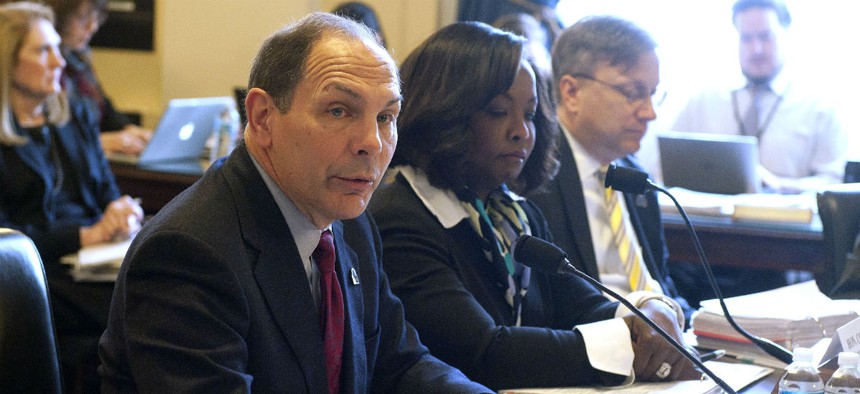
VA Secretary Bob McDonald testifies before the House Veterans' Affairs Committee Wednesday on the department's budget request. Robert Turtil/VA
VA Proposes Taking Away Senior Executives’ MSPB Appeal Rights
Department’s about-face on authority to discipline top career officials comes after judges reverse two demotions and a firing.
The Veterans Affairs Department is working with Capitol Hill to craft legislation that would prevent fired VA senior executives from appealing those removals to the Merit Systems Protection Board.
The proposal, which Deputy Secretary Sloan Gibson came up with, recommends making all VA senior executives Title 38 employees, meaning that they would not have the same standard MSPB appeal rights as Title 5 employees when it comes to disciplinary actions. In other words, the department could demote or fire senior executives for cause; that decision would be final, and not subject to reversal by the independent agency that adjudicates appeals of “adverse personnel actions” from federal employees who’ve been fired, suspended, furloughed, demoted or had their pay cut.
The latest development in the saga over disciplining VA career employees is an about-face for the department, which until this week had maintained that it had sufficient authority to fire employees. But for the third time in less than a month, an administrative judge last week reversed VA’s decision to discipline a senior executive accused of wrongdoing -- and VA officials were not happy about it. The MSPB’s decision to reverse the removal of Linda Weiss, who was the director of the Albany Stratton VA Medical Center in upstate New York, came on the heels of two other rulings overturning Gibson’s decision to demote senior executives Diana Rubens and Kimberly Graves.
“Under the Choice Act, my judgment is owed considerable deference by the MSPB,” Gibson said in a statement following the Weiss decision. “Yet based on this and other recent decisions, it appears the MSPB does not agree with Congress’ or the VA’s interpretation of the extent of my authority and has, once again, substituted its judgment for mine and demonstrated a willingness to second guess the VA’s application of legitimate high standards of accountability.”
Gibson, VA Secretary Bob McDonald and the leadership of the House and Senate Veterans’ Affairs Committees met Tuesday to discuss the idea, according to a House aide. McDonald mentioned the idea on Wednesday when he testified before the House committee on the department’s fiscal 2017 budget proposal.
“We have to do a lot more work on it, it’s just preliminary,” McDonald said on Wednesday about the proposal. Lawmakers are crafting a legislative provision now that encapsulates VA’s proposal, according to the House aide, adding that they are aiming to get something enacted this year.
“Republican support for this type of measure is all but assured,” the aide said.
The Senior Executives Association did not immediately respond to a request for comment on the proposal.
Title 38, which refers to the part of the U.S. Code overseeing certain VA employees, gives the department more flexibility in disciplining workers, but it also provides more wiggle room in setting pay and expediting hiring for certain jobs. Title 38 VA employees fall into two categories – pure and hybrid.
Pure Title 38 employees don’t have the same MSPB appeal rights as Title 5 employees do, but currently can appeal disciplinary decisions to an internal VA disciplinary appeals board, and after that, to U.S. federal court. It’s unclear whether that would factor into whatever legislative proposal is drafted based on Gibson’s idea. Hybrid Title 38 employees have the same rights to appeal adverse actions to MSPB as Title 5 employees have. The separate title and the two tracks within it emerged as a way to help the VA secretary fill certain jobs faster through the federal hiring process.
"Title 38 recognizes the medical profession in a different way," said VA media relations director James Hutton. "There is greater flexibility in pay, location premiums, disciplinary processes and other elements."
Hutton reiterated that the proposal is a work in progress and no formal legislation has been submitted.







